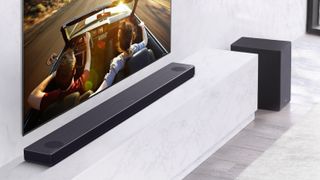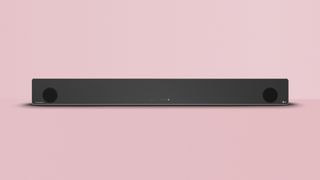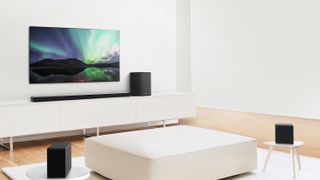LG SN11RG review: the best Dolby Atmos soundbar package so far
The LG SN11RG makes it easy to get a true Dolby Atmos dome of sound from just four boxes


The LG SN11RG isn’t cheap, but if you want a ‘real’ Dolby Atmos surround experience without the clutter of a full-on separates system, it’s one of only two soundbar packages out there that truly does the job.
-
+
Powerful and dynamic sound
-
+
Detailed and balanced rear and height channels
-
+
Sleek design for the main soundbar
-
-
Can lack hard impact at times
-
-
Voices occasionally sound slightly dislocated
-
-
Bass sometimes sounds a bit emotionless
Why you can trust T3

From this LG SN11RG review the main takeaway is that this is probably the best way to experience Dolby Atmos movies at home if you don't want multiple chunky speakers taking up your room. Absolutely one of the best soundbars on the planet, it has stretched the definition of soundbar about as far as it can be stretched. In a good way.
Tucked away inside the SN11RG’s back-breaking box alongside the main soundbar are a meaty subwoofer and two rear speakers.
What’s more, these rears join the main soundbar in carrying up-firing drivers as well as front-firing ones, indicating that it takes its built-in Dolby Atmos and DTS:X duties much more seriously than most soundbars do.
The result is a genuine sense of surround sound, with multiple overhead audio channels adding to the 3D sense… and the speaker quality is superb too, of course.
It's a big beast, mind – its width means it's a match for 65-inch TVs or 75-inch TVs (or bigger). Not that you can't pair it with 55-inch TVs, but it's going to stick out slightly to the left and right, so whether you're happy with that maybe depends on your TV unit.

LG SN11RG review: price, release date and features
The LG SN11RG was released in June 2020, and the price of £1,499/$1,600 lets us get the bad news about it out of the way early. It’s one of the most expensive soundbars around, matching the launch price of Samsung’s highly regarded HW-Q90R (the only soundbar that gives you the same experience as this), and throwing in its lot with the hi-fi likes of the new Sonos Arc, if you get that in a soundbar/subwoofer combination.
As you’d hope, though, the SN11RG has plenty of tricks up its sleeve to help justify its price. Starting with the fact that it’s capable of outputting a colossal 770W of total audio power. That should be enough to get the Albert Hall rocking, never mind your living room.
The 7.1.4 configuration of all that power is key, too. The main soundbar has forward-firing left, right and centre speakers, plus speakers in each of its ends that angle sound to create reflected side channels. It also carries two upfiring drivers, providing height effects for Atmos.
The subwoofer uses a meaty 7-inch driver that should underpin everything with plenty of rumble, and perhaps most crucially of all for the SN11RG’s high-end ambitions, the rear speakers have four drivers total rather than the usual two. So as well as firing sound forwards as you’d expect, secondary drivers in the rear speakers’ top edges fire height channel information up and forwards so that it joins the main soundbar’s upfired channels to create that ‘bubble’ of sound associated with the best object-based (Dolby Atmos and DTS:X) sound experiences.
As usual with true multi-channel soundbars, the LG SN11RG carries processing that can upconvert stereo or 5.1 sources to take advantage of all the system’s available channels. Typically these sorts of multi-channel upconversions don’t find favour with purists, especially where stereo music is concerned. But as we’ll see, LG’s Surround mode upconverter is much cleverer than most such systems.
The SN11RG supports high resolution audio formats up to 192kHz/24-bit, and can play music from a wide variety of apps – including Google Music, Spotify, YouTube and Deezer – thanks to its compatibility with the Google Home app. This lets you control the soundbar by verbal commands, too.
Connections are fair. Alongside an optical digital audio input and a USB port that supports multimedia playback are two HDMI inputs and one HDMI output. The HDMI output supports eARC functionality, meaning that it can receive lossless Dolby Atmos and DTS:X sound from TVs with eARC-capable HDMI ports.
Finally, the SN11RG’s HDMI roster can pass through 4K and HDR video to your TV, including the premium Dolby Vision HDR format. Unfortunately, though, the soundbar – like LG’s TVs – doesn’t support the HDR10+ dynamic HDR format.
To be fair, HDR10+ is much less common in the wild than other HDR formats. Amazon Prime Video uses it extensively, though, and there also a few 4K Blu-rays out there that carry it.
Note that the SN11RG’s lack of HDR10+ support doesn’t mean that titles mastered in HDR10+ won’t play through it at all. Rather they will appear as basic HDR10, with HDR10+’s extra scene by scene information stripped out.
One last handy feature of the SN11RG is an auto-calibration system, where the soundbar fires out a brief sequence of test tones so that it can adapt its sound to your room characteristics.

LG SN11RG review: sound quality
The SN11RG is easily the best result yet of LG’s ongoing collaboration with acclaimed British hi-fi/AV brand Meridian.
It’s immensely powerful, for starters. All four of its components produce prodigious amounts of volume, filling your room with a pulsating, involving, three-dimensional ball of sound. Especially as the rears – and their upfiring drivers – prove a strikingly effective match in both power and tone terms for the main soundbar.
There’s nothing forced about the volume either, so there’s no harshness to trebles, no crackling or mid-range brittleness and, unlike some previous LG soundbar systems, no lack of potency to the subwoofer’s bass contribution.
The dynamic range is impressively expansive, too. The system can swell and ebb dramatically along with a potent movie soundtrack, shifting through its gears either gently or violently, as a mix requires.
The rears and main soundbar all prove very effective at presenting even the subtlest details; subdued traffic outside a city apartment, distant dog barks, crowd murmurs and so on. Such subtleties are accurately positioned too, including above and to the side of you courtesy of the SN11RG’s ‘reflected’ height and side channels.
In fact, the soundbar’s portrayal of rear and rear height channel sounds is arguably the best I’ve heard from such a system to date. A fact which helps it produce a startlingly convincing three-dimensional soundscape for Dolby Atmos and DTS:X to place their sound effects in.
Voices sound clear no matter how dense the sound mix they’re playing against, while the Surround mode does an unusually effective job of upconverting simpler music sources, including stereo, so that they use all of the available audio channels.
The key to this upconversion’s success is that it really does feel as if the limited-channel source has been put back in a mixing deck and recreated with proper multi-channel information. The sound isn’t just mindlessly repeated across multiple channels.
If the purist in you can’t cope with stereo music not appearing as stereo, though, fear not. While the SN11RG defaults to Surround mode upmixing, you can switch to standard stereo. And if you do, the system still sounds very good; warm yet clean, dynamic yet natural, and detailed without becoming too clinical. The stereo separation is wide without becoming incoherent, too.
There are, though, still a few areas for LG and Meridian to work on for future flagship soundbars. Hard, aggressive effects, for instance, can lack impact if they appear on top of an already dense mix. The subwoofer, while undoubtedly a serious rumbler, is a bit one-dimensional compared with the sprightliness of the other speakers. Deep masculine voices can sometimes sound a bit thick and boxed in.
Minor dropouts and distortions can occur in the main soundbar at high volumes if a film has moments of really extreme dynamic range. And finally, the soundbar doesn’t disperse voices quite as widely as it ideally would, meaning people can sometimes sound like they’re speaking from slightly below your screen.

LG SN11RG review: design & usability
The main soundbar in the SN11RG package is big but beautiful. It’s about as wide as a typical 65-inch TV and nearly six inches deep, giving its drivers plenty of room to breathe. At the same time, though, it’s slim enough to sit beneath most TVs without jutting into their pictures or hiding their IR receivers.
The main soundbar is nicely finished, too. The grilled look to its front and sides is tastefully done, while the brushed metallic top looks sleek and high-end.
The single best thing about the main soundbar’s design for me, though, is its inclusion of a crisp, legible LED display. This tells you such information as the sound format being received, which input you’re using, and when it’s reacting to voice instructions. The LED automatically dims after a few seconds of no input being received, too, so as not to distract you when you’re watching a film.
The subwoofer, by comparison, is unapologetically basic looking. It’s a hefty black box with a felt side hiding its large woofer. And that’s about it. Hide it under a sideboard if you can.
The two rears are unusually large for surround speakers – even larger, in fact, than the chunky specimens you get with Samsung’s similarly specified HW-Q90R soundbar. The grilling over two sides and gently rounded corners bring a small modicum of style, but it’s still better that they’ll be sat behind you rather than in your line of sight.
The remote control supplied with the SN11RG is small but easy to use for most day to day functions. Its low button count does mean, though, that you’ll need to download the manual to figure out how to achieve one or two things. If you're connected over HDMI, you probably won't worry about using this too much anyway, other than when you want to change sound modes.
Initial installation goes pretty smoothly. You’re pretty much required to download not one but two apps to your smartphone: Google Home and LG’s own Wi-Fi Speaker app. However, while this is initially a bit annoying, the apps end up streamlining other aspects of first-time installation. It was a great relief, too, to find all the separate wireless speakers in the system automatically connecting with each other right out of the box, too.

LG SN11RG review: verdict
The LG SN11RG is an excellent soundbar for anyone who wants the full Dolby Atmos/DTS:X experience, complete with height, rear and side effects. The sensitivity and power of its rear/height speakers is particularly impressive, proving how important such speakers are to a proper Dolby Atmos/DTS:X experience.
The SN11RG is way more powerful overall than any built-in TV sound system, too. In fact, it’s arguably the first true rival for the previously all-conquering 7.1.4-channel Samsung HW-Q90R soundbar system in this area.
You really will need to have a 65-inch TV or bigger, but if your aim is to get the truly cinematic surround feeling in your home without adding way more boxes to the room, it's superb.
LG SN11RG review: Also consider
In terms of competition, we've mentioned the Samsung HW-Q90R soundbar, which is from 2019, but remains a fantastic choice – and it's significantly cheaper than the LG, though there's very little difference in audio quality between them. Read our full Samsung HW-Q90R review for all the details.
If you want the closest to this experience that a single-box soundbar can provide, you should be looking at the Sonos Arc. It can't make sound come from behind you, but it uses Dolby Atmos to create a supremely impressive wall of sound, and its audio quality is near-impeccable. It does have a potential HDMI issue, but our Sonos Arc review explains all that.
If you want to get as close to this full surround experience as you can for a lot less money (or for a smaller TV), you need to look at the Vizio 5.1.2 Dolby Atmos soundbar. A much lower price means the audio quality isn't quite as strong, and it doesn't have up-firing drivers in the rear, so the Atmos effect is less pronounced, but it's a hell of a performer for the price.
Sign up to the T3 newsletter for smarter living straight to your inbox
Get all the latest news, reviews, deals and buying guides on gorgeous tech, home and active products from the T3 experts
John Archer has been testing TVs and AV gear for over 25 years, having worked on Home Cinema Choice magazine. He's a contributor to Forbes, TechRadar, Trusted Reviews, Wired and many more places – if you've owned a TV in the last couple of decades, John's probably reviewed it somewhere. He's seen so many hot new technologies come and go, like tears in the rain.
-
 One of Netflix's most iconic shows is coming back for an epic new season
One of Netflix's most iconic shows is coming back for an epic new seasonBlack Mirror gets a seventh run
By Max Freeman-Mills Published
-
 Xiaomi just revealed one of the most interesting EVs of the year
Xiaomi just revealed one of the most interesting EVs of the yearThe Xiaomi SU7 Ultra is a Chinese EV ready to take on Porsche and Tesla
By Alistair Charlton Published
-
 Two dumbbells, 30 minutes, and six exercises to build muscle all over and a stronger core
Two dumbbells, 30 minutes, and six exercises to build muscle all over and a stronger coreA simple home workout to add muscle all over and boost strength
By Bryony Firth-Bernard Published
